<< Previous | Displaying results 11-20 of 1275 for "Liberation" | Next >>
Dachau opened in March 1933 and was the first regular concentration camp to be established by the Nazi regime. The camp was liberated by American forces on April 29, 1945. As they approached the camp, troops encountered horrific evidence of Nazi a...
World War II veterans and their families continue to uncover extremely graphic
Jubilation over the liberation of Paris: US troops parade along the Champs-Elysees and French civilians celebrate. General Charles de Gaulle and General Omar Bradley review the troops.
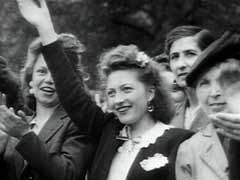
After Italy's armistice with the Allies in September 1943, the Italian army disintegrated. The country was divided between German forces holding the northern and central regions (including Rome) and Allied forces in the south. After nine months of bitter combat, Allied forces—specifically the US Fifth Army—liberated Rome in June 1944. This footage shows scenes of celebration as troops move through Rome. It ends with a prayer by Pius XII (pope, 1939–1958).
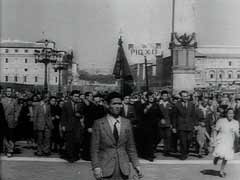
General Dwight D. Eisenhower and other American officers inspect conditions in the Ohrdruf concentration camp shortly after the liberation of the camp. As American forces had approached, SS camp guards shot the remaining prisoners before abandoning the camp. Confirmation of such atrocities prompted the US military to require Nazis and local German civilians to view the camps.
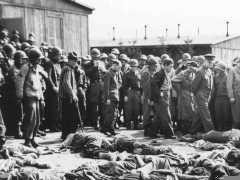
In July 1944, Soviet forces liberated the Majdanek extermination camp. The Polish-Soviet Nazi Crimes Investigation Commission, established to document Nazi atrocities committed during the German occupation of Poland, ordered exhumations at Majdanek as part of its efforts to investigate Nazi mass killings in the camp. The commission later published its findings in Moscow on September 16, 1944, in Polish, Russian, English, and French.
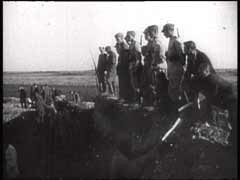
The Dachau concentration camp, northwest of Munich, Germany, was the first regular concentration camp the Nazis established in 1933. About twelve years later, on April 29, 1945, US armed forces liberated the camp. There were about 30,000 starving prisoners in the camp at the time. Here, soldiers of the US Seventh Army document conditions in the camp. They also require German civilians to tour the camp and confront Nazi atrocities.
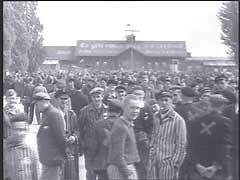
During the battle to liberate the French capital, a barricade is hastily built near the cathedral of Notre Dame. Paris, France, August 1944.
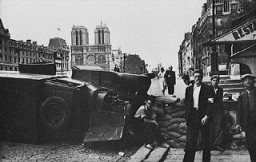
US troops march down the Champs Elysees in Paris following the Allied liberation of the city. Paris, France, August 29, 1944.
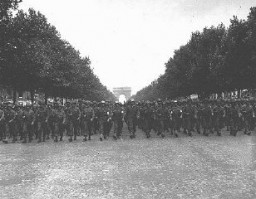
We would like to thank Crown Family Philanthropies, Abe and Ida Cooper Foundation, the Claims Conference, EVZ, and BMF for supporting the ongoing work to create content and resources for the Holocaust Encyclopedia. View the list of donor acknowledgement.